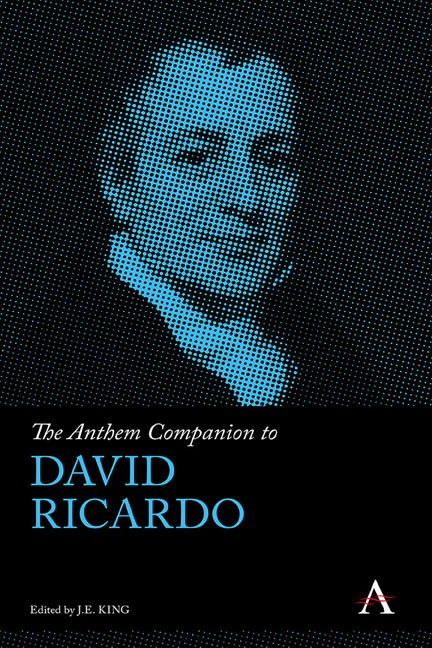Book contents
- Frontmatter
- Contents
- Notes on Contributors
- Chapter 1 Introduction
- Chapter 2 On Some Myths about Ricardo’s Theory of Money
- Chapter 3 Ricardo on Foreign Trade
- Chapter 4 ‘A Tolerably Correct Law Respecting Proportions’: Ricardo on Income Distribution
- Chapter 5 Ricardo on Economic Policy
- Chapter 6 (Mis)Interpreting Ricardo
- Chapter 7 Ricardo’s Business Activities
- Chapter 8 Political Economy ‘Through a Glass Hive’? The Encounter of Ricardian Ideas with Nineteenth-Century Australia
- Chapter 9 Ricardo and Classical Political Economy
- Chapter 10 Ricardo and Marx
- Chapter 11 Malthus and Ricardo on the Dismal Science
- Further Reading
- Index
Chapter 1 - Introduction
Published online by Cambridge University Press: 17 October 2023
- Frontmatter
- Contents
- Notes on Contributors
- Chapter 1 Introduction
- Chapter 2 On Some Myths about Ricardo’s Theory of Money
- Chapter 3 Ricardo on Foreign Trade
- Chapter 4 ‘A Tolerably Correct Law Respecting Proportions’: Ricardo on Income Distribution
- Chapter 5 Ricardo on Economic Policy
- Chapter 6 (Mis)Interpreting Ricardo
- Chapter 7 Ricardo’s Business Activities
- Chapter 8 Political Economy ‘Through a Glass Hive’? The Encounter of Ricardian Ideas with Nineteenth-Century Australia
- Chapter 9 Ricardo and Classical Political Economy
- Chapter 10 Ricardo and Marx
- Chapter 11 Malthus and Ricardo on the Dismal Science
- Further Reading
- Index
Summary
David Ricardo was born in London on 18 April 1772 into a prosperous family of Sephardic Jews. He died on 11 September 1823 from an ear infection. His father, Abraham Israel Ricardo (1733–1812) worked as a broker in the City of London and left a fortune of about £45,000. Some years ago, I made a back-of-the-envelope estimate that this would amount to approximately £23 million today (King 2013: 3). Abraham and his wife Abigail had at least seventeen children, of whom all but three were still alive when David died. Two of his younger brothers lived to the ripe old age of 89: Raphael or Ralph (1785–1875) and Moses (1776–1886), who wrote a celebrated ‘Memoir’ of his famous elder brother (X: 3–15). The reference is to volume X of the elevenvolume Works and Correspondence of David Ricardo, and this format will be used in all references to the Works throughout this book.
Surprisingly little is known about David Ricardo's youth. He did not have a particularly good education. As his brother Moses recalled, their father
[…] was a man of good intellect but uncultivated. His prejudices were exceedingly strong; and they induced him to take the opinions of his forefathers in points of religion, politics, education, &c, upon faith, and without investigation. Not only did he adopt this rule for himself, but he insisted on its being followed by his children. (X: 5)
The young David, on the other hand
[…] never yielded his assent on any important subject, until after he had thoroughly investigated it. It was perhaps in opposing these strong prejudices, that he was first led to that freedom and independence of thought for which he was so remarkable, and which indeed extended itself to the other branches of the family. (X: 5)
In December 1791, he married Priscilla Ann Wilkinson, a Quaker, which caused considerable tension with his devoutly Jewish parents. By this time, he was a convinced liberal who had no remaining commitment to Judaism.
Even more than his father, David Ricardo was highly successful in his business activities. ‘Ricardo, at the time of his marriage, was a poor man’, Max Hartwell wrote. However,
[…] at the time of his death, thirty years later, his total estate was worth between £675,000 and £775,000. How did he make such a large fortune? In three ways: as a Stock Exchange jobber, as a loan contractor, as an investor in land and French bonds. (Hartwell 1971: 40)
- Type
- Chapter
- Information
- The Anthem Companion to David Ricardo , pp. 1 - 8Publisher: Anthem PressPrint publication year: 2023



